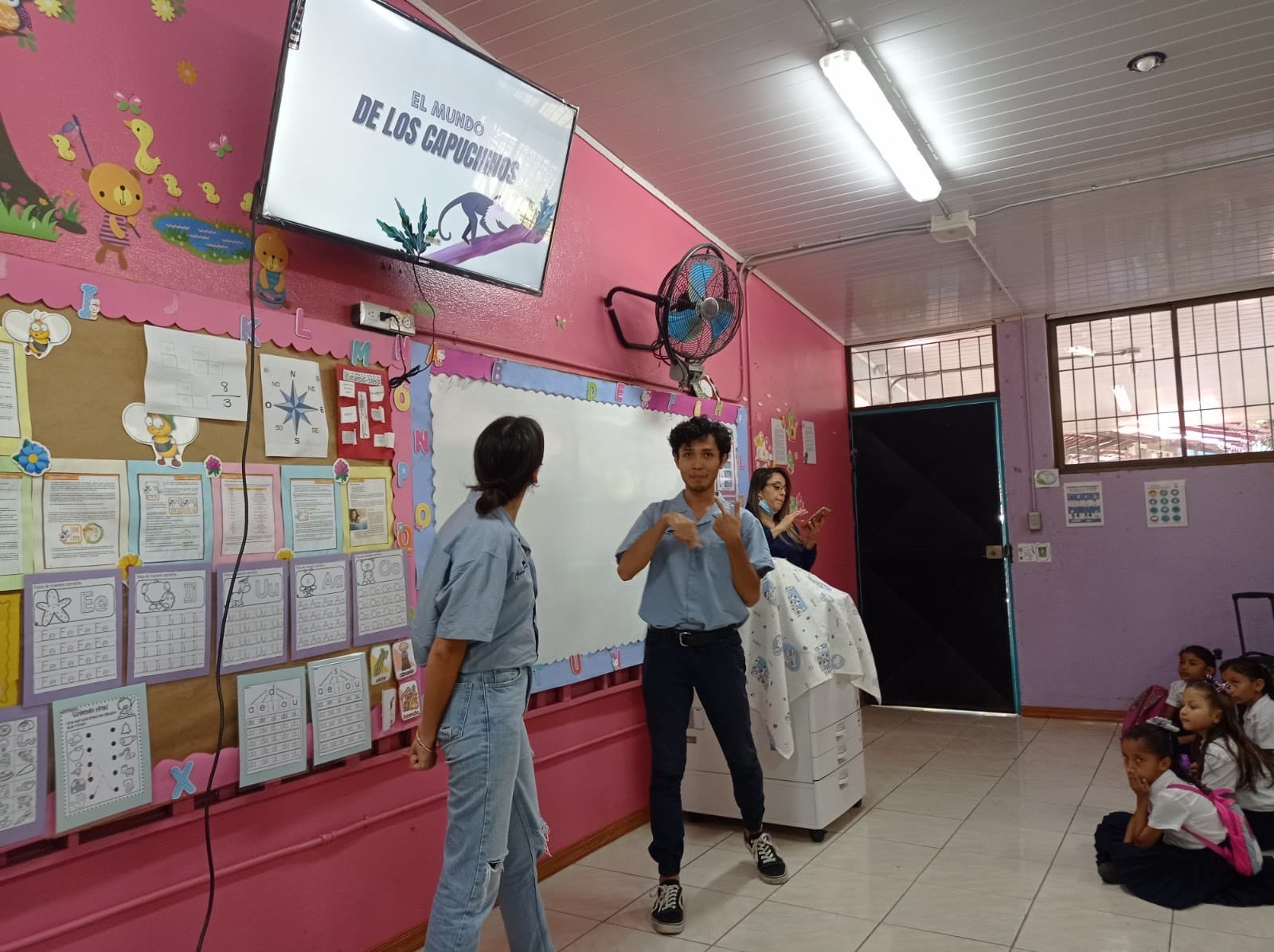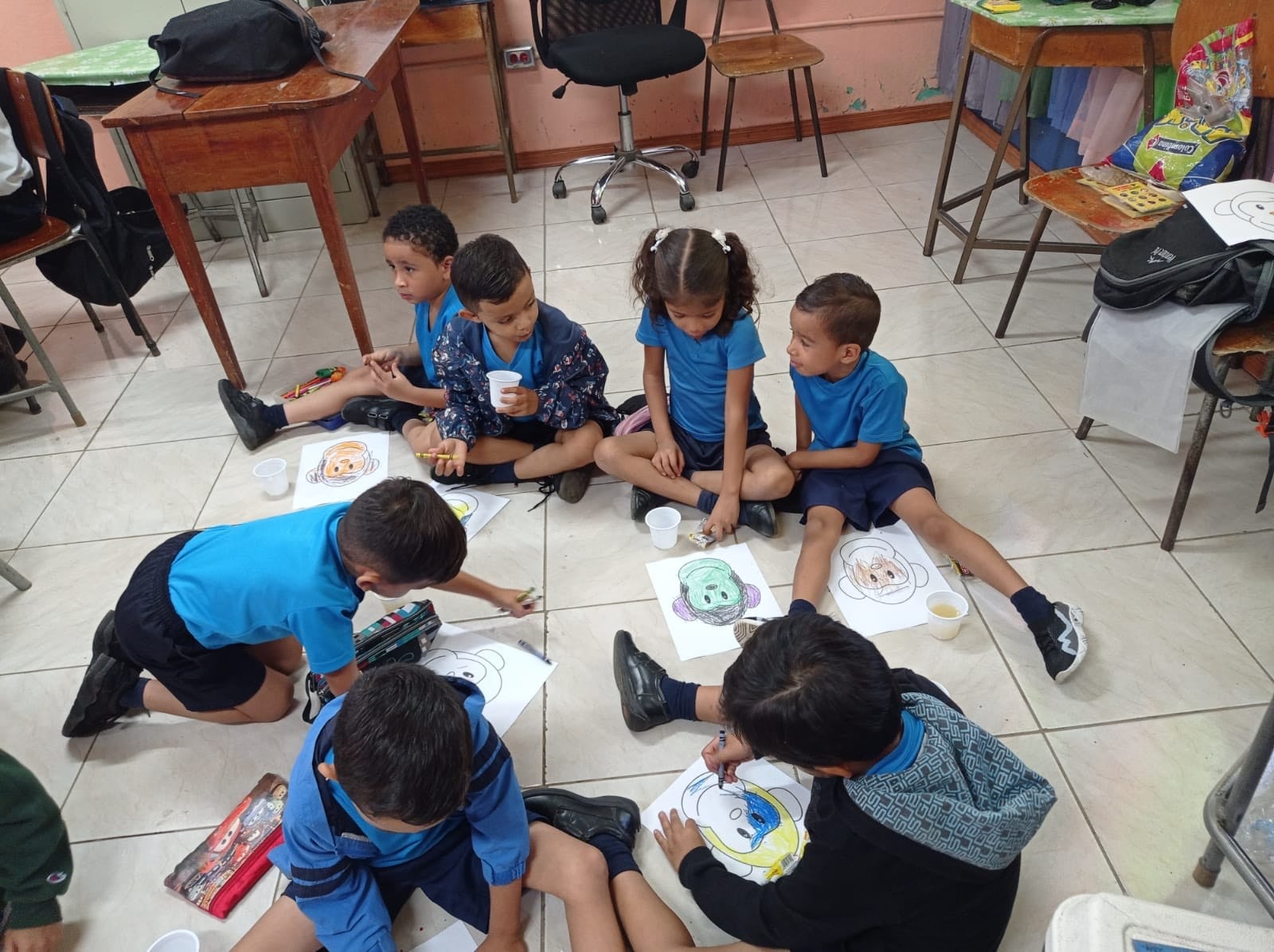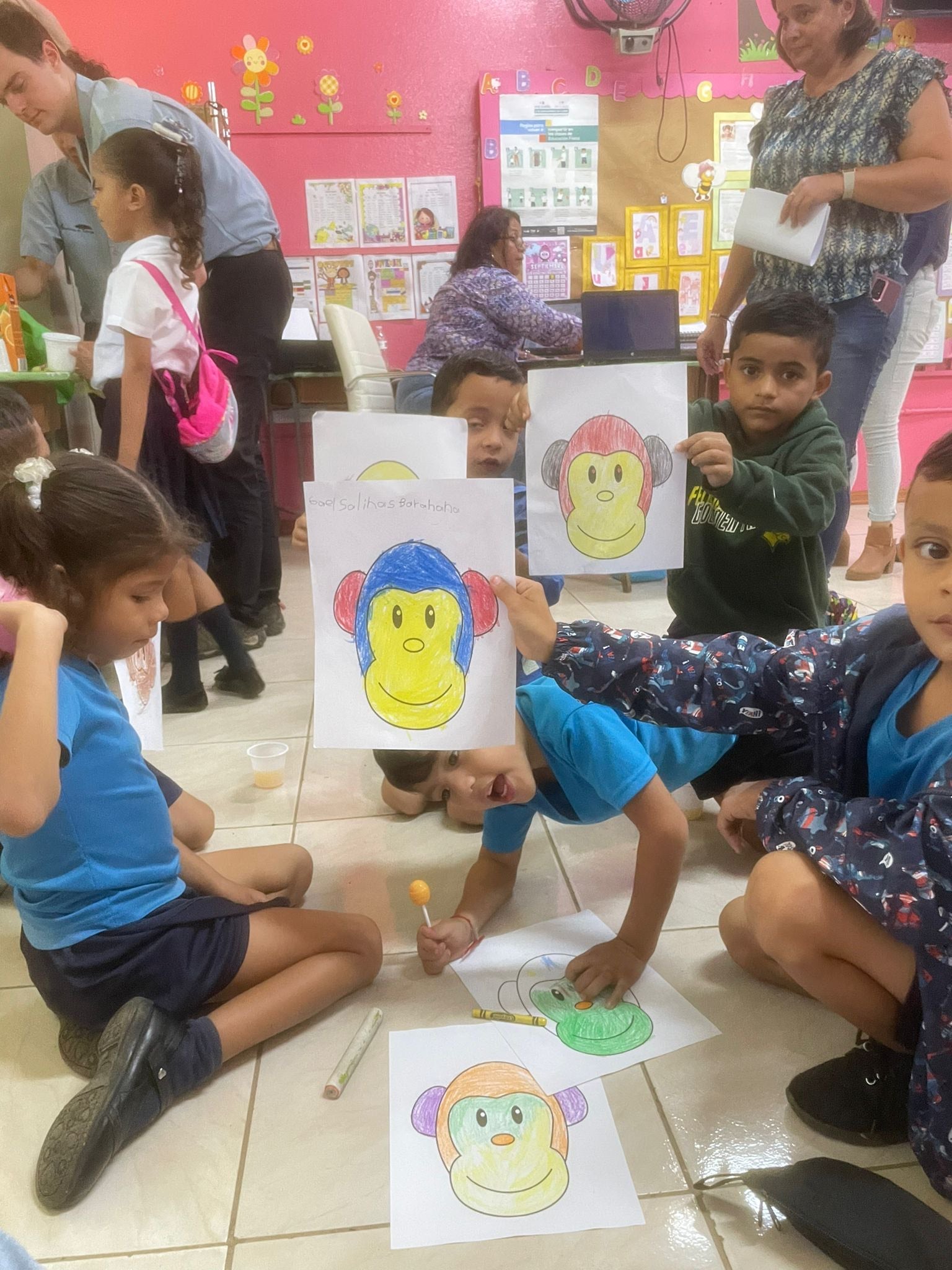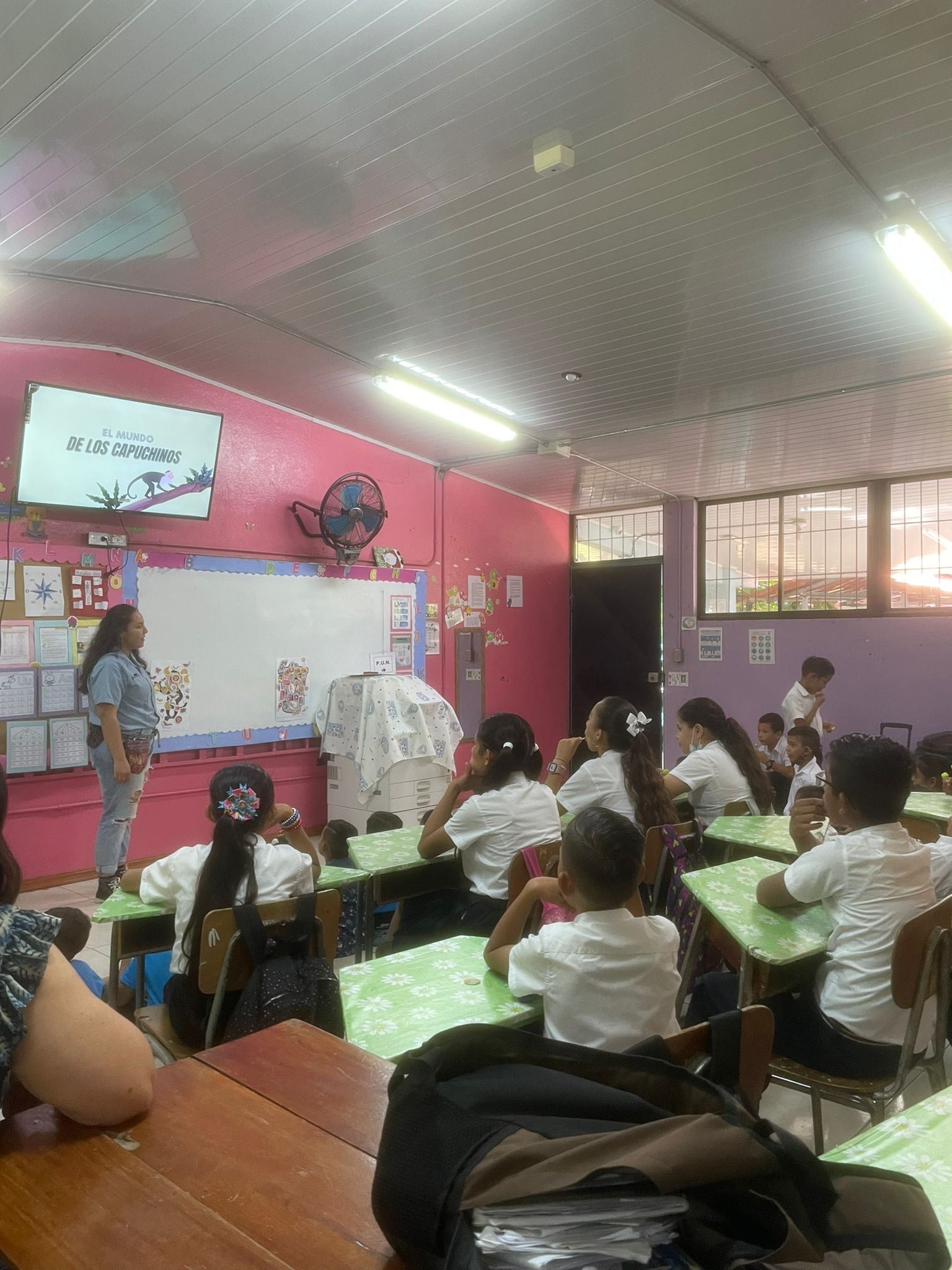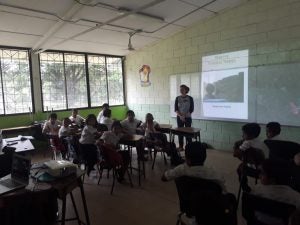Our outreach is back!
AI is coming soon to our project! Jacinta gives a talk for the Michigan Institute for Data Science, Data Science and AI Summit entitled Using machine-learning to monitor animal movement. You can watch a video of the talk here.
On Oct 04, 2022 (Blog post by Lorena Sinclair):
Four Taboga Field Assistants (Wil, Elena, Vasco and Lorena) visited “Escuela de San Luis” in Cañas to run an activities morning with the students. The school consisted of 60 extremely energetic students aged between 5 and 11, eager to learn about the world of capuchins. We made a presentation which included various videos demonstrating the different behaviours exhibited by white-faced capuchins and then using vocalisation recordings, we ran a class on how to speak the capuchin language. This included a competition of who could do the best lost call, food peep, twitter and coo impression which when combined with a lollipop as a prize, lead to very enthusiastic competitors. There was something very heart-warming about hearing all the children vocalise a “coo”, the sound used by capuchin infants to call their mothers.
We ran a game to teach about capuchin diets by giving each student a photo of a food item which they had to choose to either stick onto the poster of a monkey or the poster of a rubbish bin. Food items included fruits, plants and various junk food products. Many students were horrified to learn that capuchin diets include small mammals such as squirrels. In order to teach the lesson that even if a food item is monkey friendly, humans still should not give the food, images that included a human hand with a banana, were to be put in the bin.
After, a very animated game of Taboga Monkey Bingo was played. Through this, the students learnt a bit about how we differentiate each monkey by facial features. And finally, a capuchin face colouring session took place which produced a range of blue and green faced capuchins from the younger years and more realistically coloured white-faced capuchins from the older students.
Overall, it was a very rewarding and fun morning for us all, seeing children enthusiastic about a species that we care so much about is always refreshing. And hopefully we met some future candidates for Taboga field assistants. We look forward to reaching out to more local schools and running more outreach activities such as this.
2020-2021
Our outreach was mostly on hold across 2020-2021 due to COVID-19 precautions. With 80% of the Costa Rican population now vaccinated (as of Feb 2022), we will be ramping up our outreach once again. Stay tuned!
On June 18th, 2019
On June 13th, 2019
Bebedero Yo Te Protejo (English: Bebedero, I Protect You)
Members of the Capuchins at Taboga team were invited to join in a workshop to brainstorm ideas to help restore the town of Bebedero (about a 20 minute drive northwest of our reserve). The workshop was put on by Taboga (sugar cane farm), the Ministry of Health, the Municipality of Cañas, SINAC/MINAE, ICE, and Aventuras Arenal (tour company with a location in Bebedero). This workshop was the first of many that will seek to restore and maintain the culture, natural environment, health, and security of the town and surrounding area. Capuchins at Taboga will be involved in this project as it grows and progresses. We hope to be able to give presentations to both kids and adults about our work, the Taboga Forest Reserve, and the importance of the natural environment in general. (January, 2020)
Philadelphia Zoo
Ariek Norford (our assistant at Taboga from mid 2018 until mid 2019) shared their experiences with the Zoo Crew Program at the Philadelphia Zoo. Zoo Crew gets high school students involved in conservation education at the zoo and helps prepare them for applying to college. The panel consisted of two zoo curators, a climate activist, and Ariek (representing Capuchins at Taboga). The students asked them questions about how they got involved in their careers, what they did on a daily basis, and how they (the students) can get involved in conservation and research during and after college. Ariek showed them photos of the monkeys at Taboga and talked afterwards about different careers in primate biology.

Field Trips
We have given presentations and led small-group activities for University Técnica Nacional (UTN) field trips that have visited the site.
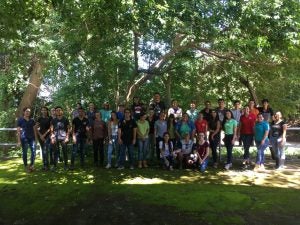

Student Collaboration
To date we’ve worked closely with nine UTN ecotourism and environmental management
students. They have learned our data collection techniques and designed and implemented their own research projects.

Biological Corridor
Capuchins @ Taboga has joined Corredor Biológico Paso el Mono Aullador, a community- and SINAC-led organization aimed to monitor the health of the biological corridor in which Taboga is situated, as well as to promote local environmental initiatives and education.

SINAC
Our project further partners with SINAC (Sistema Nacional de Áreas de Conservación, the government arm responsible for managing conservation areas within Costa Rica) in developing local education programs, participating in migratory bird counts, and collecting data on mantled howler monkey (Alouatta palliata) behavior.
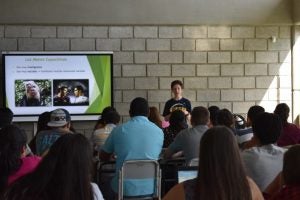
Presentations
We have delivered several presentations to UTN students and administration, employees at the UTN farm, and local community members.
McLean CR. July 22nd and 23rd, 2019. Comportamiento y cognición social de los monos carablanca. Presented to two classes of biology students at the Universidad Técnica Nacional.
McLean CR, Norford A, Ordoñez JC. January 22nd, 2019. Información preliminaria sobre monos congo y sus interacciones con monos carablanca. Presented to the Comité Local of the Corredor Biológico Paso el Mono Aullador.
Fuentes A, McLean CR, Norford A, Ordoñez JC, Richardson M. January 21st, 2019. El comportamiento de monos en estudio natural en comparación con monos en cautiverio. Presented to the staff of Centro de Rescate Las Pumas.
Fuentes A, Norford A, Ordoñez JC, Weber J. August 6th, 9th, and 14th, 2018 Comportamiento y cognición social de los monos carablanca. Presented to three classes of biology students at the Universidad Técnica Nacional.
Fuentes A, Norford A, McLean CR, Ordoñez JC. July 31st, 2018. La comunicación y cognición de los capuchinos carablanca. Presented to staff and faculty of the Universidad Técnica Nacional, LARED water research laboratory, and the Instituto Nacional de Innovación y Transferencia en Tecnología Agropecuaria.
McLean CR and Ordoñez JC. July 30th, 2018. La comunicación y cognición de los capuchinos carablanca. Presented to the university council of the Universidad Técnica Nacional of Costa Rica.
Benítez ME, McLean CR, Ordoñez JC. June 22nd, 2018. Comportamiento y cognición social de los monos carablanca. Presented to ecotourism students from the Universidad Técnica Nacional of Costa Rica.
Archbold J, Fuentes A, McLean CR, Ordoñez JC. March 3rd, 2018. Introducción al comportamiento y métodos de investigación de los monos carablanca. Presented to ecotourism students at the Universidad Técnica Nacional of Costa Rica.
Anderson C, Archbold J, Fuentes A, Ordoñez JC. December 12th, 2017. Capuchinos Taboga. Presented to staff of the Universidad Técnica Nacional, LARED water research laboratory, and the Instituto Nacional de Innovación y Transferencia en Tecnología Agropecuaria.
